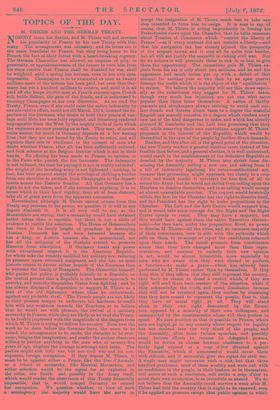TOPICS OF THE DAY.
M. TRIERS AND THE GERMAN TREATY.
NOBODY loves his dentist, and M. Thiers will not increase his popularity in France by his new Treaty with Ger- many. The arrangement was necessary, and its terms are in the main beneficial to France, but they bring home to the French the fact of their defeat with a heart-breaking cogency. The German Chancellor has allowed no impulse of pity, or generosity, or apprehensiveness of the future to turn him from his stern resolve that France shall be disabled for war, shall be weighted until a spring has become, even in her own eyes, impossible. Champagne is to be evacuated as soon as twenty millions more of the tribute has been paid, but even then Ger- many has yet a hundred millions to receive, and until it is all paid off she keeps 50,000 men at French expense upon French soil, holds Belfort, the gate of the South, and is authorised to reoccupy Champagne at her own discretion. As we read the Treaty, France, even if she could raise the entire indemnity by one convulsive effort, could not till March, 1874, demand the de- parture of the Germans, who desire to hold their points of van- tage until Metz has been fully repaired, and Strasburg rendered impregnable from the West by the mighty circle of forts which the engineers are now pressing on so fast. They may, of course, retire sooner, for much in Germany depends on a few waning lives ; but they are not bound by the Treaty to retire, and will regulate their acts in obedience to the counsel of men who doubt whether France, after all, has been sufficiently reduced, and look askance at the Belgian frontier which is not in their hands. No offering has been made to France, to opinion, or to the Fates who punish the too fortunate. The indemnity is not reduced, the time for paying it is not in reality extended ; the weight of the invading army is not lightened ; nothing, in fact, has been granted except the privilege of shifting a burden from one shoulder to another, from Champagne to the depart- ments nearer the• Eastern frontier. All that Germany has a right to ask she takes, and if she surrenders anything, it is on terms which in their hard rigidity, their air of keen distrust, take all Of grace away from the apparent concession.
Nevertheless, although M. Thiers cannot obtain from this Treaty any increase to his power, we question if it will in any degree diminish it. It is all very well to say, as the Monarchists are saying, that a monarchy would have obtained better terms than a republic, but there is not a tittle of evidence to justify the assertion. The House of Hohenzollern has risen to its lonely height of grandeur by destroying thrones. Denmark has not been favoured because she has a king, or Austria because she is monarchical, nor has all the antiquity of the Guelphs availed to preserve Hanover from absorption. If Germany treats any power with exceptional respect, it is the American Republic, for whose sake she recently modified her military law, reducing its pressure upon returned emigrants, and she has no more historic reason to favour either branch of the Bourbons than to welcome the family of Bonaparte. The Chancellor himself, who guides her policy, is probably friendly to a Republic, on the cynical ground that a Republic is the nearest approach to anarchy, and anarchy disqualifies States from fighting ; and he has always displayed a disposition to support M. Thiers as a man of the old diplomacy, whose ideas he understands, against any probable rival. The French people are not likely in their present temper to underrate his hardness, to credit him with any weakness towards the Bourbons, or to believe that he would see with pleasure the revival of a military monarchy in France, while they are likely, as we read the Treaty, to be freshly impressed with the magnitude of the dangers from which M. Thine is trying to deliver his country. Even now the work to be done before the Germans leave, the sums to be raised, the arrangements to be made, the obstacles to be over- come, fatigue the imagination, and render the coolest observers willing to pardon anything to the man who, at seventy-five years of age, displays the courage to attempt such tasks. The parties might risk civil war, but not civil war and its con-
sequence, foreign occupation. If they depose M. Thiers, it must be to appoint either a Prince, like the Duc d'Aumale, or a friend of monarchy, like Marshal Macmahon, and either selection would be the signal for an explosion in the cities, the South, and possibly in the Army itself, which would render the observance of this Treaty financially impossible, that is, would compel Germany to extend her occupation. We question whether, in view of such a oontiogeney, the majority would have the nerve to accept the resignation of M. Thiers, much less to take any step intended to force him to resign. It is easy to say, of course, that M. Thiers is acting imprudently in forcing hie Protectionist views upon the Chamber, that he talks nonsense, about Treaties of Commerce which "restrict the liberty of France"—as if every contract did not restrict a liberty—and that his navigation tax has already injured the prosperity of the seaport towns, and it may all be quite true besides but all will not justify the majority in risking civil war. Nor do we believe it will persuade them to risk it, or him to give- them the opportunity. The immediate gain M. Thiers ex- pects from his tax is only about two millions, and he and his opponents had much better put up with a deficit of that amount for another year or two than by an open quarrel damage the credit which it is the object of the "equilibrium" to secure. We believe the majority will see this, more especi- ally as the substitutes they suggest for M. Thiers' taxes, though very much less injurious, are not one whit more popular than those taxes themselves. A nation of thrifty peasants and shopkeepers always striving to avoid cash out- lays dreads and detests direct taxes to a degree the wasteful English can scarcely conceive, to a degree which renders every new tax of the kind dangerous to order, and which has already alarmed M. Gatnbetta and the Left into promising that they will, while reserving their own convictions, support M. Thiere proposals in the interest of the Republic, which would be- discredited in the eyes of the people by further direct demands..
Besides, and this after all is the grand point of the situation, the new Treaty renders a general election more instead of less feasible than before, and a general election, it is well understood, would result in the establishment of the definitive Republic so dreaded by the majority. M. Thiers may shrink from dis- missing the Assembly, calling a new one, and asking from it a bill of indemnity legalising his extra-constitutional act, because that proceeding might approach too closely to a coup. d'itat, and would render it necessary for him first of all to secure the Army ; but he would not shrink from calling upon the Members to dissolve themselves, and in so calling would occupy an almost unassailable position. The request would be strictly within the law, for the Chamber has the right to dissolve itself, and the President has the right to make propositions to the Chamber. The Left and the Left Centre would support him, and it would take some courage for the Right and the Right Centre openly to resist. They may have a majority, but they would have against them the entire Executive Govern- ment—for they have, under the proposition Rivet, no power to dismiss M. Thiers—all the cities, and an immense majority of their constituents, sure to side with the authority which calls on them to re-accept or reject the candidates returned upon their hands. The moral pressure from constituents- aware that they have changed more than their repre- sentatives, and anxious to embody their new opinion in act, would be almost irresistible, more especially by men who are aware that they were elected to perform a function—to make a peace—which has already been performed by M. Thiers rather than by themselves. If they deny this, if they affirm that they still represent the country, they have no reason to dread a verdict which, if they are- right, will send them back masters of the situation, while if they acknowledge the truth, and resist dissolution because. they will not be returned again, they confess by remaining that they have ceased to represent the people, that is, that they have no moral right at all. They will stand alone in their own right, denounced by the Execu tive, opposed by a minority of their own colleagues, and unsupported by the constituencias whose will they profess to speak. No such position as that is possible in France, where men are logical, pr in any country where respect for legality has not entered into the very blood of the people, and the Assembly, after some furious speeches, and possibly some furious efforts to resume its delegated powers, would be driven to choose between obedience to a per- fectly legal request or a coup detat directed against the Executive, which if unsuccessful would cover them with ridicule, and if successful, give the signal for civil war. A single man might encounter such a risk, but that three hundred gentlemen, most of them wealthy and worn out, with no confidence in the people, in their leaders, or in themselves, will arrive at such a resolution, will strike a coup d'ilat to avoid their own re-election, is as incredible as absurd. We do not believe that the Assembly could survive a week after M. Thiers had told the country that it ought to be renewed, even if he applied no pressure except that public opinion to which
representatives, of all men, are naturally most sensitive, and which is quite as strongly felt in France as on this side the Channel, the public voting in the Chamber constantly reversing the vote by ballot. The Assembly, as it exists, lies in the last resort at the mercy of M. Thiers, and will either be dissolved, or in fear of a dissolution will accede to his demands.



































 Previous page
Previous page